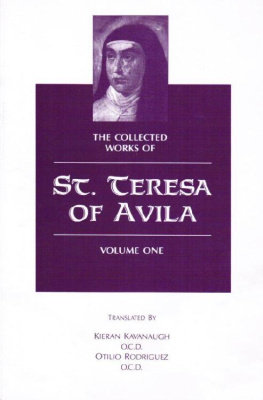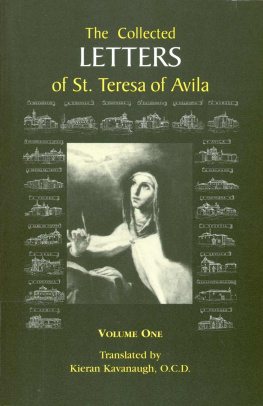
The Collected Works of
St. Teresa of Avila
Volume Two
Translated by
Kieran Kavanaugh, O.C.D.
Otilio Rodriguez, O.C.D.
Washington Province of Discalced Carmelites, Inc. 1980, 2012
ICS Publications
2131 Lincoln Road NE
Washington, D.C. 20002
All rights reserved. No part of this book may be reproduced
or transmitted in any form or by any means, electronic
or mechanical, including photocopying, recording,
or by any information storage and retrieval system without
prior written permission from the publisher.
Cover: Portrait of St. Teresa of Jesus (15151582),
The Ahumada Portrait, commissioned by the saints family;
artist unknown; Real Academia de la Historia, Madrid, Spain.
ACKNOWLEDGEMENT
Special thanks to the Discalced Carmelite nuns of Terre Haute, Indiana,
and Baltimore and Port Tobacco, Maryland,
for their assistance in providing this image and for their historical research on it. Cover design by Say Yes Design
Typesetting by the Carmel of Indianapolis Library of Congress Cataloging-in-Publications Data (Revised)
Teresa, Saint, 1515 1582
The collected works of St. Teresa of Avila.
Includes bibliographical references and index.
CONTENTS: v. 1. The book of her life. Spiritual testimonies.
Soliloquies. v. 2. The way of perfection. Meditations on the song
of songs. The interior castle. v. 3. The book of her foundations.
Minor works. 1. Catholic Church Collected works.
2. Theology Collected works 16th century.
BX890.T353 1976
248 75-31305
ISBN: 0-9600876-6-4
ISBN-13 print : 978-0-9600876-6-2
ISBN epub: 978-0935216127
Table of Contents
The reason I founded this monastery with such strict observance.
Treats of how one should not worry about bodily needs and of the blessing there is in poverty.
Continues the subject she began to discuss in the first chapter; she urges her Sisters always to busy themselves begging God to help those who labor for the Church. The chapter ends with an earnest plea.
Urges the observance of the rule and discusses three things that are important for the spiritual life. Explains the first of these, which is love of neighbor, and how particular friendships do harm.
Continues on the subject of confessors. Speaks of the importance of their being learned.
Returns to the subject already begun, that of perfect love.
Treats of the same subject, spiritual love, and gives some advice on how to obtain it.
The great good that lies in detaching oneself inwardly and outwardly from all created things.
On how good it is for those who have left the world to flee from relatives and how they find truer friends.
How it is not enough to be detached from what was mentioned if we are not detached from ourselves, and how both this virtue of detachment and humility go together.
Continues to discuss mortification, and speaks about what must be acquired in sickness.
How the true lover of God will have little regard for his own life and honor.
Continues to discuss mortification and how one must flee from the world's maxims and rules about honor in order to arrive at true wisdom.
The importance of not allowing anyone to make profession whose spirit goes contrary to the things mentioned.
The great good that lies in not excusing oneself even when blamed without fault.
The difference that must lie between the perfection of the life of contemplatives and that of those who are simply content with the practice of mental prayer. How it is possible that God may at times raise a distracted soul to perfect contemplation and the reason for His doing so. This chapter and the following one are very noteworthy.
Not all souls are suited for contemplation, and some reach it late. The truly humble person must be content with the path along which God leads him.
Continues on the same subject and tells how the trials of contemplatives are much greater than those of persons living an active life. This chapter is very consoling for these latter.
Begins to discuss prayer. Speaks to souls unable to reason with the intellect.
How in different ways consolation is never lacking on the path of prayer. Counsels the Sisters to let their conversations deal always with prayer.
Tells how important it is to begin the practice of prayer with great determination and not pay any attention to obstacles set up by the devil.
Explains what mental prayer is.
Treats of how important it is for one who has begun the path of prayer not to turn back and speaks once more of the great value that lies in beginning with determination.
How vocal prayer must be recited with perfection, and mental prayer joined with it.
Tells how much the soul gains through a perfect recitation of vocal prayer and how God happens to raise it from this prayer to supernatural things.
Explains a method for recollecting one's mind. Sets down some ways of doing this. The chapter is very useful for beginners in prayer.
Deals with the great love our Lord showed us in the first words of the Our Father and how important it is for those who truly want to be children of God to pay no attention whatsoever to lineage.
Explains the nature of the prayer of recollection and sets down some ways of getting accustomed to this form of prayer.
Continues to present means for obtaining this prayer of recollection. How little it should matter to us whether or not we are favored by the bishop.
The importance of understanding what is being asked for in prayer. Deals with the next words of the Our Father: Sanctificetur nomen tuum, adveniat regnum tuum. Applies these words to the prayer of quiet and begins to explain this kind of prayer.
Continues on the same subject. Explains the nature of the prayer of quiet. Gives some advice for those who experience it. This chapter should be carefully noted.
Discusses the words of the Our Father, Fiat voluntas tua sicut in caelo et in terra; the great deal a person does when he says them with full determination; and how well the Lord repays this. [So I counsel you to be attentive because the matter is very important.]
Deals with the great need we have that the Lord give us what we ask for in these words of the Our Father: Panem nostrum quotidianum da nobis hodie.
Continues on the same subject. The matter is very helpful with regard to the time immediately following reception of the most Blessed Sacrament.
With a prayerful exclamation to the Eternal Father concludes the subject that was begun.
Discusses these words of the Our Father: Dimitte nobis debita nostra.
Speaks of the excellence of this prayer, the Our Father, and of how we shall in many ways find consolation in it.
Deals with the great need we have to beseech the Eternal Father to grant us what we ask for in the words, Et ne nos inducas in tentationem, sed libera nos a malo; and explains some temptations. The subject matter is important.
Continues the same subject, gives advice about some different kinds of temptations, and sets down two remedies by which to free oneself from them.
Tells how by striving always to walk in the love and the fear of God we will proceed safely among so many temptations.
Speaks of the fear of God and of how we must be on guard against venial sins.
Discusses these last words of the Our Father: Sed libera nos a malo. Amen. But deliver us from evil. Amen.
Treats of the veneration with which the Sacred Scriptures should be read and of the difficulty women have in comprehending them, especially the Song of Songs .
Treats of nine kinds of false peace presented to the soul by the world, the flesh, and the devil. Explains the holiness of the religious state. This holiness leads to the true peace desired by the bride in the Song of Songs .
Next page









